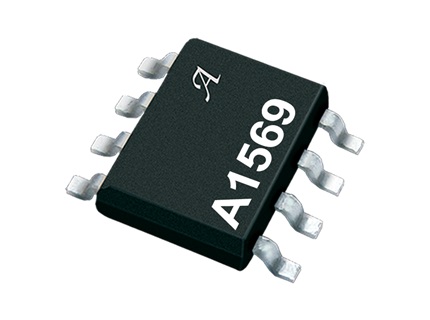Allegro MicroSystems, LLC Announces Unique LED Driver With Integrated Hall-Effect Switch

Elegant Single Chip Solution For LED Lighting
Worcester, MA – Allegro MicroSystems, LLC announces the release of the world’s first LED driver IC that features an integrated Hall-effect switch. The A1569 enables compact, elegant, reliable, and fault-tolerant LED lighting with minimal electrical engineering and low component-count and cost. A single silicon chip integrates: a Hall plate, a small-signal amplifier, chopper stabilization, a Schmitt trigger, and a LED driver with soft on/off and short circuit and thermal protection with automatic recovery. The integrated solid-state Hall-effect switch supports silent, sealed, contactless activation and offers a significant upgrade from failure-prone mechanical switches.
The LED driver features low-noise, adjustable, linear drive of up to 150 mA into one or more LEDs. An optional external capacitor programs the turn-on/turn-off rate, adding an elegant “theater” effect. It is controlled by the Hall-effect switch and turns on and off in response to a magnet. The Hall-effect switch is omnipolar (responsive to both North and South magnetic poles) and highly sensitive (BOP = 40 G) to support a wide range of mechanical configurations and enclosures with various air gaps and degrees of mechanical misalignment.
This new device complements Allegro Microsystem’s existing portfolios of LED drivers and Hall-effect switches. It is targeted at consumer electronics, white goods, boats, RVs, motorcycles, and interior and auxiliary automotive lighting applications such as glove boxes, center consoles, vanity mirrors, trunks/boots, truck beds, etc. The on-board regulator permits operation with supply voltages of 7 to 24 V. Reliability and EMC performance are enhanced with Zener clamps, output short-circuit protection, thermal shutdown, and reverse-battery protection. Superior Hall switch performance is made possible through dynamic offset cancellation, which reduces the residual offset voltage normally caused by device overmolding, temperature drift, and thermal stress.
The device is available in two versions: the “K” option is an automotive-grade (AEC-Q100) device that operates from –40°C to +125°C; the “E” option is for industrial and consumer applications that operate from –40°C to 85°C. Both versions feature a RoHS-compliant, thermally enhanced SOIC-8 surface-mount package (designator “LJ”).
